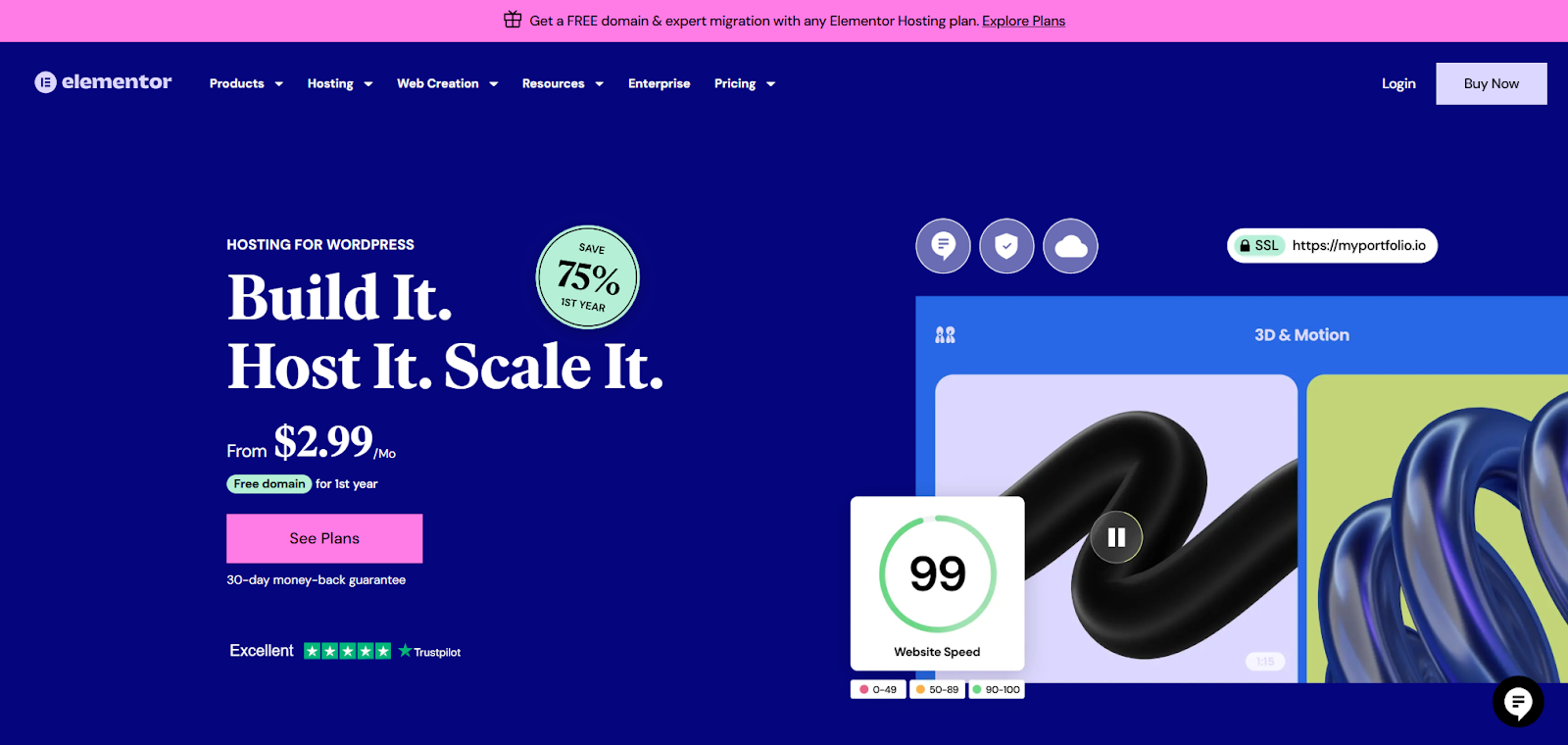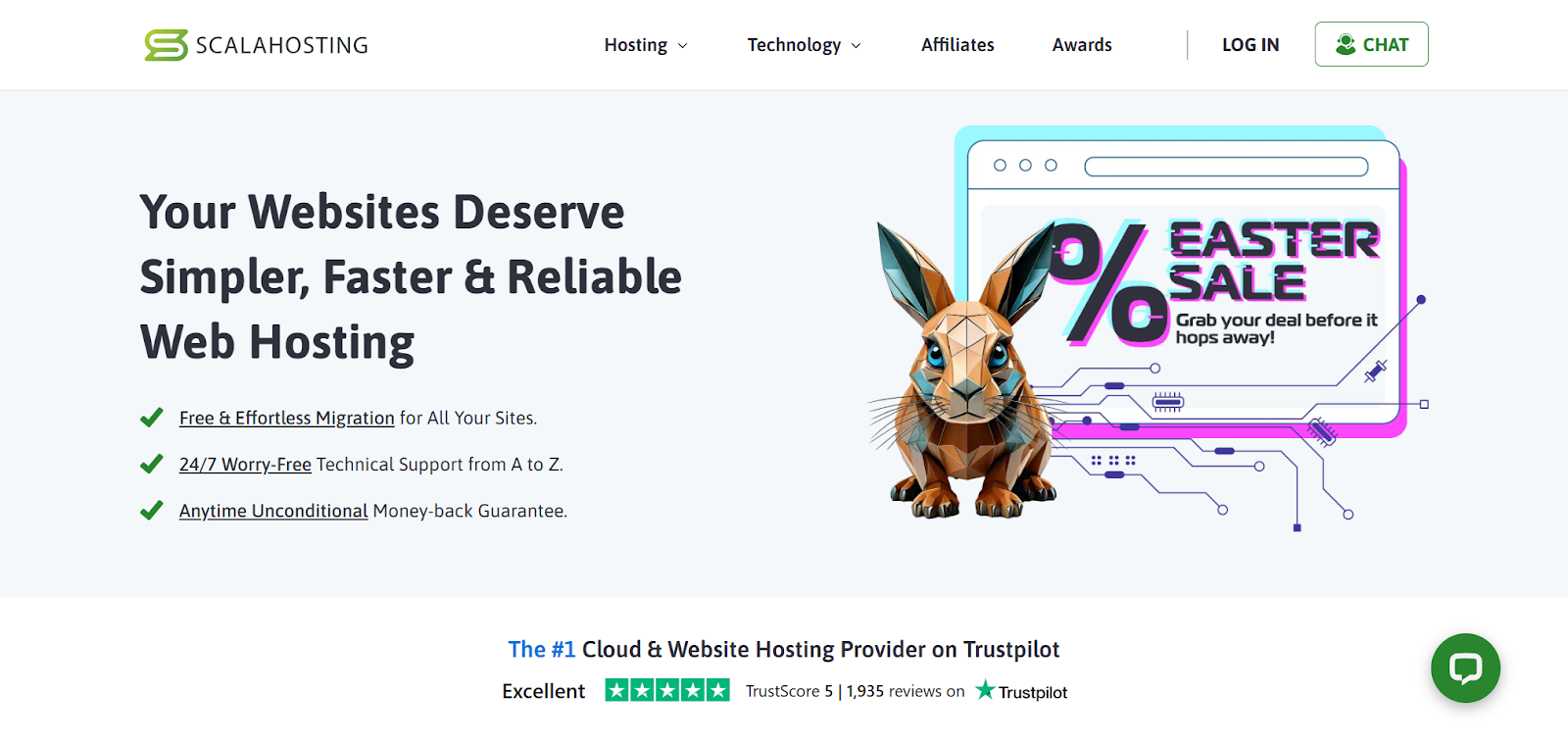Choosing the right provider is a big decision, maybe one of the most important ones you’ll make for your online presence. It affects your site’s speed, security, reliability, and how easy it is to manage. Get it right, and you’ve got a solid foundation. Get it wrong? Well, let’s just say it can lead to headaches you don’t need.
With so many options out there, figuring out the best fit can feel overwhelming. Today, we’re looking at three popular choices for 2025: OVHcloud, ScalaHosting, and Elementor Hosting. We’ll break down what each offers to help you make an informed decision for your website.
OVHcloud vs ScalaHosting vs Elementor Hosting in 2025: A Close Look
Choosing a host isn’t just about price; it’s about finding the right package of features, performance, support, and ease of use that matches your specific needs. Let’s see how these three stack up.
Elementor Hosting: The All-in-One Solution for WordPress Websites

Right off the bat, Elementor Hosting is built with a specific user in mind: WordPress creators, especially those using the Elementor page builder. If you’re building or managing a WordPress site with Elementor, this option is designed to make your life easier.
What is it?
Elementor Hosting is a managed WordPress hosting solution. This means they handle many of the technical backend tasks for you – server management, security configurations, updates, backups – freeing you up to focus on designing and growing your site.
Key Features & Benefits:
- Built on Google Cloud Platform: It runs on Google Cloud’s premium C2 servers, known for strong performance and reliability. This includes NVMe storage, which is significantly faster than older SSDs, leading to quicker load times.
- Elementor Core Pre-installed: You get WordPress and the free Elementor Core plugin installed right out of the box. Elementor Core gives you the powerful drag-and-drop editor and a solid set of basic widgets and templates to build your site.
- Important Note: Elementor Hosting includes Elementor Core, the free version of the builder. If you need advanced features like the Theme Builder, Form Builder, WooCommerce Builder, pop-ups, motion effects, or the full library of Pro widgets and templates, you’ll need to purchase an Elementor Pro license separately. Pro is an upgrade that significantly expands your design capabilities for more complex and professional websites.
- Managed Environment: Automatic WordPress updates, daily backups stored offsite (with easy restore), and built-in security measures take technical worries off your plate.
- Integrated CDN: It includes Cloudflare Enterprise CDN, a premium service that caches your site content globally, making it load faster for visitors no matter where they are.
- Security Focused: Comes with free SSL certificates, DDoS protection, a web application firewall (WAF), and 24/7 security monitoring.
- Dedicated Support: Offers 24/7 support from experts who understand both WordPress and Elementor. You can even raise support tickets directly from your WordPress dashboard in some cases.
- User-Friendly Dashboard: Features a custom hosting dashboard designed for simplicity, making it easy to manage your site, domains, and hosting features.
- Staging Environment: Includes a one-click staging site feature, allowing you to test changes safely before pushing them live.
Key Strengths:
Seamless integration with WordPress and Elementor, high-performance infrastructure (Google Cloud, NVMe, CDN), strong security focus, ease of use for non-technical users, dedicated expert support.
Who is it Best For?
Individuals, freelancers, agencies, and businesses building websites with WordPress and Elementor who value performance, security, ease of use, and integrated support without wanting to manage server technicalities.
OVHcloud: Versatile Hosting for Various Needs

OVHcloud is a large, global hosting provider offering a wide spectrum of services, from affordable shared hosting to powerful dedicated servers and public cloud solutions.
What is it?
OVHcloud provides a range of hosting types, appealing to users from beginners to large enterprises. Their shared hosting plans are often budget-friendly, while their VPS and dedicated options offer more power and control.
Key Features & Benefits:
- Broad Service Range: Offers shared hosting, VPS (Virtual Private Servers), dedicated servers, public cloud, private cloud, and domain registration.
- Global Data Centers: Has a significant number of data centers worldwide, allowing you to potentially host your site closer to your target audience for reduced latency.
- Competitive Pricing: Often known for competitive pricing, especially on dedicated servers and some VPS plans.
- DDoS Protection: Generally includes anti-DDoS protection across its network.
- Scalability: Provides options to scale up from shared hosting to more powerful solutions as your site grows.
- Control Panel: Uses standard control panels or custom OVHcloud panels, depending on the service.
Key Strengths:
Wide variety of hosting solutions, extensive global infrastructure, often competitive pricing, good options for technically experienced users needing dedicated resources or specific configurations.
Who is it Best For?
Users needing a wide range of hosting options (beyond just WordPress), budget-conscious users looking for basic shared hosting, experienced developers or businesses needing VPS or dedicated servers with more control, and those requiring hosting in specific global locations.
ScalaHosting: Focus on Managed VPS and Security

ScalaHosting has carved out a niche, particularly with its managed VPS hosting solutions featuring its proprietary control panel and security tools.
What is it?
ScalaHosting offers shared hosting but is particularly known for its managed and self-managed Cloud VPS hosting. They aim to provide VPS power with easier management.
Key Features & Benefits:
- SPanel: Developed their own cPanel alternative called SPanel, available on their VPS plans. It’s designed to be lightweight and avoids cPanel licensing fees.
- SShield Security: Offers a proprietary security suite, SShield, which provides real-time monitoring, blocking attacks, and malware detection.
- Managed VPS: Their managed VPS plans handle server upkeep, security, and updates, making VPS hosting more accessible.
- NVMe Storage: Offers NVMe SSD storage options on many plans for faster performance.
- Free Website Migration: Provides free migration services to help move your existing site.
- Customer Support: Generally receives positive reviews for responsive and helpful 24/7 customer support via live chat, phone, and tickets.
- Daily Backups: Includes automatic daily remote backups.
Key Strengths:
Strong focus on managed VPS with user-friendly SPanel, proactive SShield security features, good customer support reputation, NVMe storage availability, included migration service.
Who is it Best For?
Users who have outgrown shared hosting and need the power and resources of a VPS but prefer a managed environment. Businesses prioritizing security features like real-time monitoring. Users looking for a cPanel alternative or wanting strong customer support.
Grow Your Sales
- Incredibly Fast Store
- Sales Optimization
- Enterprise-Grade Security
- 24/7 Expert Service

- Incredibly Fast Store
- Sales Optimization
- Enterprise-Grade Security
- 24/7 Expert Service
- Prompt your Code & Add Custom Code, HTML, or CSS with ease
- Generate or edit with AI for Tailored Images
- Use Copilot for predictive stylized container layouts

- Prompt your Code & Add Custom Code, HTML, or CSS with ease
- Generate or edit with AI for Tailored Images
- Use Copilot for predictive stylized container layouts
- Craft or Translate Content at Lightning Speed
Top-Performing Website
- Super-Fast Websites
- Enterprise-Grade Security
- Any Site, Every Business
- 24/7 Expert Service

Top-Performing Website
- Super-Fast Websites
- Enterprise-Grade Security
- Any Site, Every Business
- 24/7 Expert Service
- Drag & Drop Website Builder, No Code Required
- Over 100 Widgets, for Every Purpose
- Professional Design Features for Pixel Perfect Design

- Drag & Drop Website Builder, No Code Required
- Over 100 Widgets, for Every Purpose
- Professional Design Features for Pixel Perfect Design
- Marketing & eCommerce Features to Increase Conversion
- Ensure Reliable Email Delivery for Your Website
- Simple Setup, No SMTP Configuration Needed
- Centralized Email Insights for Better Tracking

- Ensure Reliable Email Delivery for Your Website
- Simple Setup, No SMTP Configuration Needed
- Centralized Email Insights for Better Tracking

- Ensure Reliable Email Delivery for Your Website
- Simple Setup, No SMTP Configuration Needed
- Centralized Email Insights for Better Tracking
Selecting the Best Hosting Plan for You
Okay, we’ve looked at the contenders. But how do you choose the right one? It boils down to understanding your own needs. Forget the hype and focus on these key factors:
- Hosting Tuned for WordPress/WooCommerce: If you’re running a WordPress or WooCommerce site (like most Elementor users), a host optimized for it makes a difference. This means server configurations tweaked for WordPress speed, specific security rules, and support staff who get WordPress. Elementor Hosting shines here, being built specifically for this purpose. ScalaHosting also offers WordPress-specific plans. OVHcloud supports WordPress, but its optimization might be more general depending on the plan.
- Define Your Website’s Hosting Needs: What kind of site are you running? A simple blog has different needs than a high-traffic e-commerce store or a membership site. Consider:
- Traffic Volume: How many visitors do you expect now? In the future?
- Storage Space: How much disk space do your files, images, and database require? Elementor Hosting provides 20GB, which is generous for many sites. Check the limits on OVHcloud and ScalaHosting plans.
- Complexity: Does your site use many plugins, dynamic content, or complex queries? More complex sites need more server resources (CPU, RAM).
- Planning Hosting for Future Site Growth (Scalability): Your hosting should grow with you. Can you easily upgrade your plan or resources without significant hassle or downtime? Cloud-based platforms like Elementor Hosting (built on Google Cloud) and Cloud VPS options from ScalaHosting or OVHcloud generally offer better scalability than traditional shared hosting.
- Managing Your Web Hosting Budget Wisely: Price matters, but don’t let it be the only factor. The cheapest plan might cost you more in the long run through poor performance or downtime. Compare the value – what features, performance, and support are you getting for the price? Factor in potential add-on costs (like SSL, backups, CDN if not included).
- Why Hosting Reliability & Uptime Matter: Every minute your site is down, you could lose visitors, sales, and credibility. Look for hosts with a strong uptime guarantee (99.9% is standard) and a reliable infrastructure (like Google Cloud used by Elementor Hosting). Check independent reviews for real-world uptime performance.
- Faster Speeds with NVMe Server Storage: We mentioned this before, but it’s worth repeating. NVMe SSD storage is much faster than older SATA SSDs and traditional HDDs. This directly impacts your site’s loading speed and responsiveness. Elementor Hosting uses it. ScalaHosting offers it. Check OVHcloud plan specifics. Faster speeds improve user experience and can even positively influence SEO.
- The Value of 24/7 Expert Hosting Support: When something goes wrong (and eventually, it might), you need quick access to knowledgeable support. Look for 24/7 availability through channels like live chat, phone, or email. Bonus points if the support team understands your specific platform (like WordPress/Elementor support from Elementor Hosting).
- Need for an Easy-to-Use Control Panel: How will you manage your hosting account, domains, emails, and databases? A clean, intuitive control panel saves time and frustration. Elementor Hosting offers a simplified custom dashboard. ScalaHosting has SPanel on VPS. OVHcloud uses various panels. Consider your technical comfort level.
Key Factors for Smooth Hosting Migration
Moving your website from one host to another can seem daunting, but planning makes it manageable.
- Understanding Data Transfer: This involves copying your website files (themes, plugins, uploads) and your database (posts, pages, settings, user info) to the new host. Many hosts, like Elementor Hosting and ScalaHosting, offer migration tools or services to simplify this. If doing it manually, tools like SFTP/FTP clients and database management tools (like phpMyAdmin) are needed.
- Handling Your Domain Name: You’ll need to point your domain name (your www address) to the new hosting server. This is done by updating the DNS (Domain Name System) records, specifically the A records or nameservers, at your domain registrar (where you bought the domain). DNS changes can take a few hours up to 48 hours to fully propagate worldwide.
- Choosing Where to Host Your Emails: Will you host your emails with your new web host, keep them with your old host (if possible), or use a dedicated email provider like Google Workspace or Microsoft 365? Decide this beforehand.
- Tips to Prevent Downtime:
- Migrate During Low Traffic: Schedule the move for a time when your site typically gets the fewest visitors.
- Test Thoroughly: Use the new host’s staging environment or temporary URL to test everything before pointing your domain. Check links, forms, images, and functionality.
- Don’t Cancel Old Hosting Immediately: Keep your old hosting active for a few days after the migration is complete, just in case you need to roll back or access old files.
- Lower DNS TTL: Before migrating, you can lower the Time-To-Live (TTL) value on your DNS records. This tells networks to check for updates more frequently, potentially speeding up propagation when you make the switch (remember to set it back afterward).
- Using Simple One-Click Migration Tools: Many WordPress migration plugins (like Duplicator, All-in-One WP Migration, Migrate Guru) can bundle your site into a package for easy transfer. Some hosts, including Elementor Hosting, might offer specialized migration tools or free managed migration services.
Boosting Site Performance on New Hosting
Moving to a better host is a great start, but you can often optimize further.
- Actionable Performance Tuning: Beyond hosting, look at your site itself. Optimize images (compress them!), minimize code (CSS/JavaScript), limit heavy plugins, and optimize your database.
- Using Caching & CDN: Caching stores frequently accessed data temporarily, so it doesn’t need to be regenerated for every visitor. Most good hosts offer server-level caching. A CDN (Content Delivery Network) stores copies of your static files (images, CSS, JS) on servers worldwide, delivering them from the location closest to the visitor. Elementor Hosting includes Cloudflare Enterprise CDN, a top-tier service.
- Gains from Cloud Infrastructure: Hosting built on cloud platforms like Google Cloud (used by Elementor Hosting) or AWS offers inherent advantages in scalability, reliability, and access to powerful networks and hardware like NVMe storage.
- Essential Regular Maintenance: Keep WordPress core, themes, and plugins updated. Regularly clean your database and check for errors. Consistent maintenance prevents performance degradation.
Essential Web Hosting Security Measures
Website security isn’t optional; it’s crucial. While a good host provides a secure foundation, site security is a shared responsibility.
- SSL and HTTPS: An SSL certificate encrypts data between your site and visitors (that little padlock icon). HTTPS is essential for trust, SEO, and security. Reputable hosts like Elementor Hosting, OVHcloud, and ScalaHosting typically provide free SSL certificates (often via Let’s Encrypt). Ensure it’s active and correctly configured.
- Strong Access Control: Use strong, unique passwords for everything (hosting account, WordPress admin, FTP, database). Enable Multi-Factor Authentication (MFA/2FA) wherever possible – this adds a crucial layer of security beyond just a password.
- Regular Backups: We can’t stress this enough. Automatic, regular backups stored securely offsite are your safety net against data loss, hacking, or errors. Elementor Hosting and ScalaHosting emphasize daily backups. Verify your host’s backup policy and test the restore process.
- Updates and Patch Management: Keep everything updated: WordPress core, themes, and plugins. Updates often contain crucial security patches. Managed hosting (like Elementor Hosting) often handles core WordPress updates automatically.
- Firewalls (WAF): A Web Application Firewall (WAF) filters malicious traffic before it even reaches your website, blocking common attacks like SQL injection and cross-site scripting. Elementor Hosting includes a WAF. ScalaHosting has SShield. Cloudflare (often used as a CDN) also provides WAF capabilities.
- Security Scanning & Monitoring: Regular scans can detect malware or vulnerabilities. Many hosts offer this, or you can use security plugins. 24/7 server monitoring by the host helps catch issues early.
- Secure Connections: Use SFTP (Secure File Transfer Protocol) instead of standard FTP for transferring files. Ensure your database access is properly secured.
What’s Next for the Web Hosting Industry?
The hosting world is always evolving. Looking ahead to 2025 and beyond, we see a few key trends:
- AI & Automation: Expect more AI-driven tools for performance optimization, security threat detection, automated resource scaling, and even smarter customer support (like chatbots backed by real experts).
- Cloud & Edge Computing: Cloud hosting’s flexibility and scalability continue to dominate. Edge computing, often paired with CDNs, brings content and processing even closer to the end-user for maximum speed.
- Sustainability (Green Hosting): Environmental impact is a growing concern. More providers are focusing on using renewable energy sources for their data centers, optimizing server efficiency, and offering eco-friendly hosting options. Elementor Hosting, for example, leverages Google Cloud’s commitment to renewable energy.
- Enhanced Security Focus: With threats constantly evolving, expect even more sophisticated security measures like advanced AI-based threat intelligence, zero-trust architecture principles, and robust compliance tools becoming standard.
Conclusion
Choosing between OVHcloud, ScalaHosting, and Elementor Hosting in 2025 depends entirely on your priorities.
- OVHcloud offers a vast range of services and global reach, potentially appealing to those with diverse hosting needs or requiring dedicated resources on a budget, possibly with more technical expertise.
- ScalaHosting provides strong managed VPS options with user-friendly tools like SPanel and a focus on security through SShield, making it a good step up from shared hosting.
- Elementor Hosting delivers a premium, managed WordPress experience tightly integrated with the Elementor builder (Core version included), built on high-performance Google Cloud infrastructure with robust security and expert support. It’s ideal for users prioritizing ease of use, speed, and reliability for their Elementor sites. Remember to factor in a separate Elementor Pro license if you need advanced design features.
The “best” host is the one that aligns perfectly with your website’s technical requirements, your budget, your growth plans, and your comfort level with managing the technical side. Analyze your needs, compare the features and value offered, and choose the foundation that will best support your online success.
Looking for fresh content?
By entering your email, you agree to receive Elementor emails, including marketing emails,
and agree to our Terms & Conditions and Privacy Policy.

